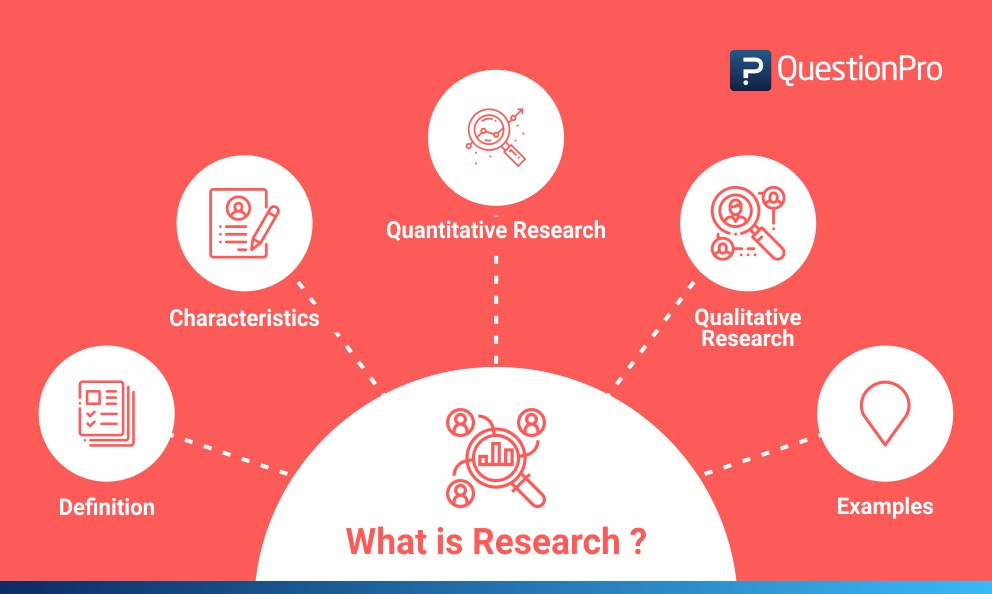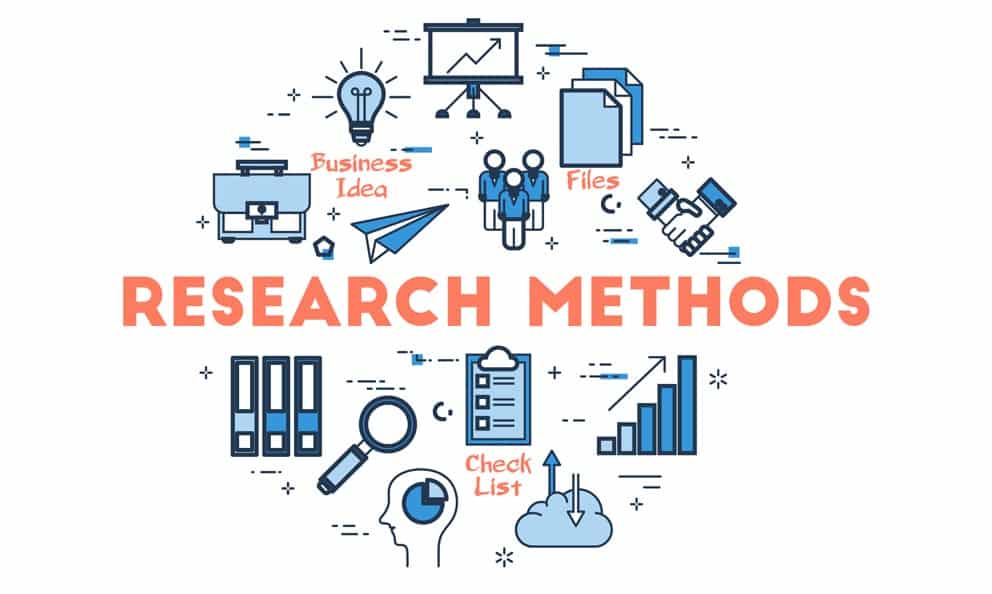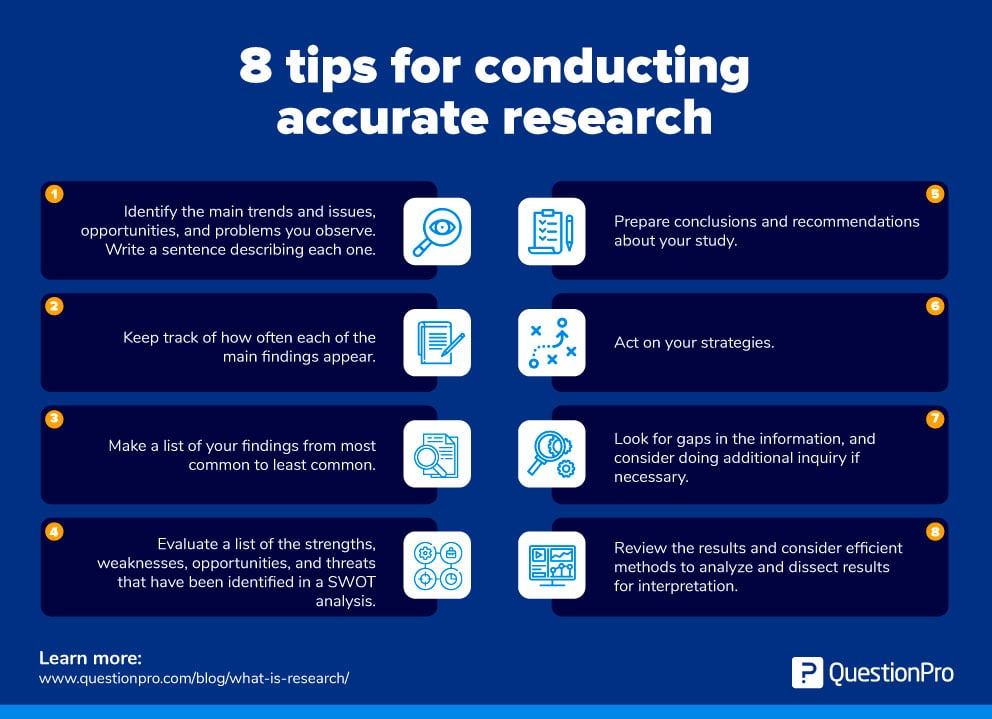
The search for knowledge is closely linked to the object of study; that is, to the reconstruction of the facts that will provide an explanation to an observed event and that at first sight can be considered as a problem. It is very human to seek answers and satisfy our curiosity. Let’s talk about research.
What is Research?
Research is the careful consideration of study regarding a particular concern or research problem using scientific methods. According to the American sociologist Earl Robert Babbie, “research is a systematic inquiry to describe, explain, predict, and control the observed phenomenon. It involves inductive and deductive methods.”
Inductive methods analyze an observed event, while deductive methods verify the observed event. Inductive approaches are associated with qualitative research, and deductive methods are more commonly associated with quantitative analysis.
Research is conducted with a purpose to:
- Identify potential and new customers
- Understand existing customers
- Set pragmatic goals
- Develop productive market strategies
- Address business challenges
- Put together a business expansion plan
- Identify new business opportunities
What are the characteristics of research?
- Good research follows a systematic approach to capture accurate data. Researchers need to practice ethics and a code of conduct while making observations or drawing conclusions.
- The analysis is based on logical reasoning and involves both inductive and deductive methods.
- Real-time data and knowledge is derived from actual observations in natural settings.
- There is an in-depth analysis of all data collected so that there are no anomalies associated with it.
- It creates a path for generating new questions. Existing data helps create more research opportunities.
- It is analytical and uses all the available data so that there is no ambiguity in inference.
- Accuracy is one of the most critical aspects of research. The information must be accurate and correct. For example, laboratories provide a controlled environment to collect data. Accuracy is measured in the instruments used, the calibrations of instruments or tools, and the experiment’s final result.
What is the purpose of research?
There are three main purposes:
- Exploratory: As the name suggests, researchers conduct exploratory studies to explore a group of questions. The answers and analytics may not offer a conclusion to the perceived problem. It is undertaken to handle new problem areas that haven’t been explored before. This exploratory process lays the foundation for more conclusive data collection and analysis.
- Descriptive: It focuses on expanding knowledge on current issues through a process of data collection. Descriptive research describe the behavior of a sample population. Only one variable is required to conduct the study. The three primary purposes of descriptive studies are describing, explaining, and validating the findings. For example, a study conducted to know if top-level management leaders in the 21st century possess the moral right to receive a considerable sum of money from the company profit.
- Explanatory: Causal research or explanatory research is conducted to understand the impact of specific changes in existing standard procedures. Running experiments is the most popular form. For example, a study that is conducted to understand the effect of rebranding on customer loyalty.
Here is a comparative analysis chart for a better understanding:
| Exploratory Research | Descriptive Research | Explanatory Research | |
| Approach used | Unstructured | Structured | Highly structured |
| Conducted through | Asking questions | Asking questions | By using hypotheses. |
| Time | Early stages of decision making | Later stages of decision making | Later stages of decision making |
It begins by asking the right questions and choosing an appropriate method to investigate the problem. After collecting answers to your questions, you can analyze the findings or observations to draw reasonable conclusions.
When it comes to customers and market studies, the more thorough your questions, the better the analysis. You get essential insights into brand perception and product needs by thoroughly collecting customer data through surveys and questionnaires. You can use this data to make smart decisions about your marketing strategies to position your business effectively.
To make sense of your study and get insights faster, it helps to use a research repository as a single source of truth in your organization and manage your research data in one centralized repository.
Types of research methods and Examples
Research methods are broadly classified as Qualitative and Quantitative.
Both methods have distinctive properties and data collection methods.
Qualitative methods
Qualitative research is a method that collects data using conversational methods, usually open-ended questions. The responses collected are essentially non-numerical. This method helps a researcher understand what participants think and why they think in a particular way.
Types of qualitative methods include:
- One-to-one Interview
- Focus Groups
- Ethnographic studies
- Text Analysis
- Case Study
Quantitative methods
Quantitative methods deal with numbers and measurable forms. It uses a systematic way of investigating events or data. It answers questions to justify relationships with measurable variables to either explain, predict, or control a phenomenon.
Types of quantitative methods include:
LEARN MORE: Descriptive Research vs Correlational Research
Remember, it is only valuable and useful when it is valid, accurate, and reliable. Incorrect results can lead to customer churn and a decrease in sales.
It is essential to ensure that your data is:
- Valid – founded, logical, rigorous, and impartial.
- Accurate – free of errors and including required details.
- Reliable – other people who investigate in the same way can produce similar results.
- Timely – current and collected within an appropriate time frame.
- Complete – includes all the data you need to support your business decisions.
8 tips for conducting accurate research
- Identify the main trends and issues, opportunities, and problems you observe. Write a sentence describing each one.
- Keep track of the frequency with which each of the main findings appears.
- Make a list of your findings from the most common to the least common.
- Evaluate a list of the strengths, weaknesses, opportunities, and threats identified in a SWOT analysis.
- Prepare conclusions and recommendations about your study.
- Act on your strategies
- Look for gaps in the information, and consider doing additional inquiry if necessary
- Plan to review the results and consider efficient methods to analyze and interpret results.
Review your goals before making any conclusions about your study. Remember how the process you have completed and the data you have gathered help answer your questions. Ask yourself if what your analysis revealed facilitates the identification of your conclusions and recommendations.









